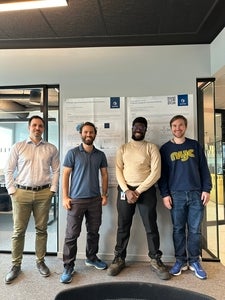Shawn Benedict's Award-Winning Journey in Nanotechnology Engineering and AI
Fourth-year student Shawn Benedict has won the Peggy Jarvie Award, sponsored by the Cooperative Education and Internship Association!
Benedict entered the Nanotechnology Engineering Program with the aim of having a diverse co-op experience to explore multiple options and potential career pathways. Through a co-op in his third year, he attended the prestigious CES conference in Las Vegas, where he was entrusted to meet executives from international companies.
“My varied co-op experience has given me a better appreciation for my program and has really helped me to see all the doors my program opens for me. All these opportunities, connections, and tangible skills have helped solidify my confidence. I know that wherever I am, I will have the ability to thrive.”

Shawn ( second from the left) with the team that authored the research paper
The highlight of his co-op experiences was traveling to Norway and working at SINTEF, a nonprofit research organization that collaborates with industry to uncover new discoveries. SINTEF conducts research for industry partners and governments around Europe and beyond.
Benedict was working in the math and cybernetics department focusing on AI. His work at SINTEF was in software development and AI research. Benedict was working on algorithms that attempt to predict when an AI model is being inaccurate.
For this co-op, Benedict was tasked with working on an international project that included several organizations around the world called EXAIGON to refactor a large and messy codebase.
Refactoring can be tedious, underappreciated, and difficult to do well. Benedict spent extra time studying and learning new refactoring principles. He also spent time during and outside of work researching new concepts to keep up with his supervisors regarding the complex mathematics involved that is normally handled by PhDs.
Although the project he was assigned was highly complex, he successfully leveraged the knowledge gained from his nanotechnology engineering coursework and previous co-ops to exceed his supervisors' expectations.
“My base statistics knowledge was heavily used as I was given a project that relies on graduate-level statistics. There were also some more direct connections to coursework in terms of subjects I took after that term,” says Benedict. “For example, I am currently in a course that touches on some of the same kinds of machine learning as in my co-op.”
Benedict and a colleague completed the refactoring in under half the expected time. In that brief period, he implemented a new core code structure, boosting the program's speed by 500 percent.
This success led to him being entrusted with the implementation of new methods for the EXAIGON project, which were significantly more accurate than previous methods when it came to predicting when the AI would be incorrect. As his confidence grew, he proposed his own extensions and took leadership of the project.
“My supervisors did not expect any notable research contributions as I had little experience with the graduate level concepts required. The EXAIGON project revolved around making AI more trustworthy to be applied in creating safer autonomous vehicles.”
The results of this project led to Benedict making a significant contribution to a research paper that was accepted to the Northern Lights Deep Learning Conference in Norway.
“The proudest moment of my co-op term was when I realized that the method I developed made a significant improvement to the project and that I had the opportunity to include it in an academic paper.”
Benedict also had a wonderful social experience during his time in Norway. He enjoyed playing ultimate frisbee and played in seven frisbee tournaments, including the European Ultimate Indoor Championships. Through this experience he made new friends from at least 10 different countries in the four months that he was in Norway.
Notably, during his undergraduate degree Benedict has earned over six scholarships, including the highest average in his cohort, and an NSERC Research Award.
Benedict is graduating in the spring of 2025 and is going to pursue a PhD in the Department of Chemical Engineering.
“I did not think I would ever go to grad school. I wanted to go straight to industry, but this co-op reminded me of how much I like research and development, so I want those skills whether I end up in academia or industry.”
Benedict will be traveling to Arizona to accept the Peggy Jarvie Award and is looking forward to a new adventure in grad school!

Shawn (in yellow) playing indoor frisbee